| 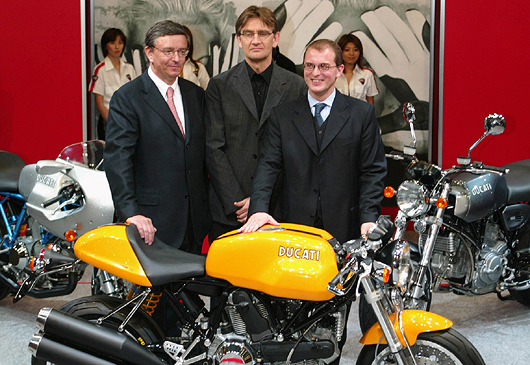
Exclusive
Worldwide First Preview!
Dream
Classics:
Ducati Launches 3 new Concept Bikes in Tokyo
Inspired by the Sportbikes of the 1970s,
Ducati’s Three Sport Classic Prototypes are the Stuff of
Enthusiast’s Dreams
Tokyo Motor Show, Japan, Oct. 22st 2003: “Our
dreams live in the legends of racing, in riders like Paul Smart
who helped us to write some of the most wonderful pages in the
history of world motorcycling. Our dreams live in the simple and
classic lines, the rich details and the colours of those trail-blazing
Ducati sport bikes of the 1970s.
The three
bikes that we are unveiling today represent the perfect mixture
of winning technology - always a Ducati hallmark - with the timeless
beauty of Ducati Design. PaulSmart, Sport, GT - three motorcycles
designed to wet the appetites of enthusiasts everywhere, giving
our Ducatisti, we hope, something to dream about. The bikes you
see today are one-off items. They are not for sale. And yet, at
Ducati we know that dreams sometimes come true.”
It was with
these words that Federico Minoli, President of Ducati Motor Holding,
presented the company’s three concept bikes to the press
at the opening of this year’s Tokyo Motorshow.Whilst
all three machines embody the same essential concept, timeless
Ducati design linked with high performance, the individual designs,
named PaulSmart 1000, GT 1000 and Sport 1000 offer three particular
expressions of Ducati heritage while utilizing the latest and
most innovative Ducati technologies.
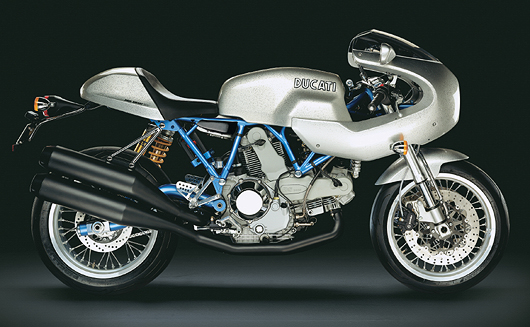
The Paul
Smart 1000 is inspired by the 750 Imola on which Paul Smart rode
to victory in the historic 200 Miles of Imola in 1972. The Paul
Smart 1000 bike brings the spirit of its predecessor back to life
with levels of performance able that surpass the expectations
of today’s most demanding two-wheel enthusiasts.
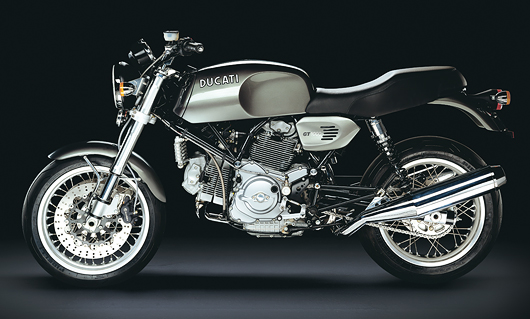
The GT 1000
is a sport bike eminently suitable for everyday use, striking
a perfect balance between the comfort of a two-seater and the
performance of a two-cylinder Desmo. Tradition and stylish elegance
are merged seamlessly in this machine, made even more interesting
by high-spec componentry and by the handling and safety typical
of present-day Ducati motorcycles.

The Sport
1000 is a gutsy “Café Racer”. Ducati through-and-through,
with a coat of bold Ducati yellow paint, the Sport delivers timeless
good looks and excitement that fans and enthusiasts expect of
all Ducati sport bikes.
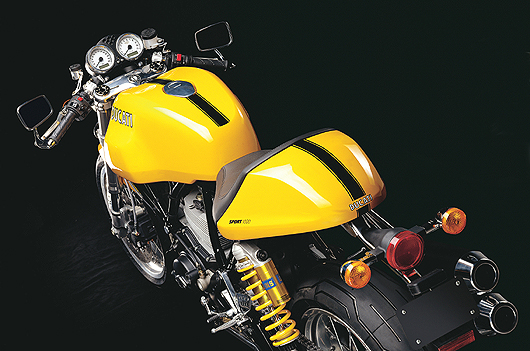
All three
bikes are equipped with the Desmo 1000 DS engine and cut a stylish
figure with the unmistakable tubular tressle frame, characteristic
of models made in Borgo Panigale. State-of-the-art engineering
solutions make these three machines benchmarks in terms of technology,
design and performance. Clearly, Japan is an important launch
scenario for the SportClassic family. It is also a significant
market, where the Ducati marque enjoys popularity and is seen
as a genuine status symbol. The Japanese have always had an eye
for exclusive products – witnessed by the success of the
MH900 in this market.
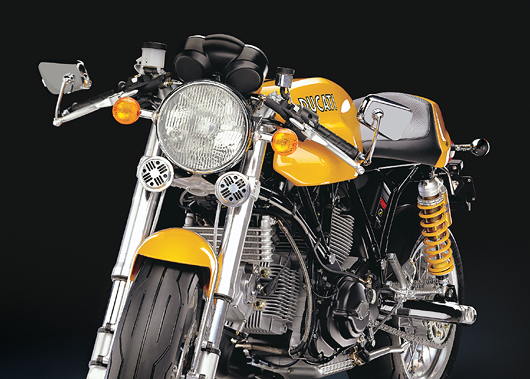
Today, Ducati
has a market share of 4.65% (3,857 bikes sold in 2002), in Japan
achieved through an increase in growth of 9.8% over the previous
year, when a remarkable 50.9% growth was recorded. A further increase
is forecast for 2003, and indeed the last few months have seen
a string of positive signals arriving from this market, allowing
Ducati to close out the second quarter in style, with overall
sales for 2003 up 4.3% on the same period in 2002 and registering
an all-time record for Ducati in a single quarter.
Also important
is the imminent addition of two new Ducati Stores in Japan, which
should be open by the end of the year, bringing the number of
single-brand outlets to 9. In total, Japan has 67 points of sale
around the country. This progress has been achieved thanks to
the launch of new and dynamic products in the Japanese market,
like the Multistrada, which both here and in many other countries
— Italy included — is enjoying an incredible level
of success, even beyond Ducati’s expectations (sales of
3,000 machines forecast for the first half, with around 6,000
built to meet demand for the rest of the year). The 999 and 749
have also seen successful launches in 2003.
Tremendous
momentum has been generated by superb race track performances
by the ‘Rosse di Borgo Panigale’, culminating in the
rider’s title (Neil Hodgson on a 999) and the constructor’s
title (won in 2003 Superbike). In MotoGP, the first year of involvement
for Ducati in the series, a new bike, the Desmosedici, ridden
by Loris Capirossi and Troy Bayliss, was the only real challenger
to the Honda.
Also on view
at the Tokyo Motorshow are all the important new bikes, accessories
and apparel seen in Milan at the EICMA event. The Japanese market
will see for the first time the ultra-new ST machines, the Sport
Touring family (completely revamped and equipped with the new
Desmo3 three-valve power unit), the new 999R and 749R (absolute
gems of racing technology deriving directly from experience gained
on the race track), the 749s, and the new Monster 620 (new 6-speed
gearbox and new APTC clutch).
Added
bonus! Janelle and Ducati 999S FastDates.com Screensavers
Click on the links to these pics and then save to your computer
hard drive.
You'll find more pictures
and a profile feature of Janelle in Meet
the Models and in Members
Corner.
1). Janelle's
Curb Appeal
2). Janelle
on the 999S
3). Janelle
- Decissions!
Jannelle
tests the 999S: Page
One
Return
to • New
Ducati Bikes • Pit
Lane News |
|
|
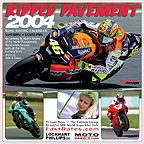

Order
Your
Ducati Sport Classic Now March
1, 2004 - Since the launch of the Ducati SportClassic family of
concept bikes at the Tokyo Motorshow in October 2003, and their
subsequent exhibition at key motorcycle shows around the world,
they have received an enthusiastic response that has been nothing
short of incredible.
Ducati has always made an effort to include our enthusiasts opinions
in our decision making process, so in response to overwhelming
requests Ducati has decided to put all three SportClassic models
into production.
Therefore,
starting March 1st 2004 and until September 1st 2004, Ducati dealers
worldwide will accept advanced reservations for the first production
of all three Sport Classic models. By reserving early these customers
will be first in line to receive their bikes, and will benefit
from favorable introductory pricing.
Reservations can be made only at your authorized Ducati dealer.
Those who reserve a Sport Classic before September 1st 2004 will
also have the added benefit of access to a special section of
ducati.com that has “insider” details about the development
process and interviews with the Ducati Sport Classic development
team. Additionally they will receive special mailings from Ducati
that include Sport Classic memorabilia and offers.
"I am
extremely impressed with the outpouring of enthusiasm and support
that Ducatisti have shown for the Sport Classics," said Federico
Minoli, President and CEO of Ducati. "We have always believed
in our fans instincts and opinions, and now, thanks to their passion,
their and our dreams are becoming a reality."
Click
here
for more information on the SportClassic motorcycles.
Ducati's
new 999 Superbike
Technical changes,
factory
rider's impressions
Engineer Andrea Forni, head of the Ducati Vehicle Testing Department
summarizes the fundamentals behind the Ducati 999's improved "dynamic
response".
How would you describe the dynamic characteristics of the Ducati
999 compared to the traditional handling of the models produced
by Ducati?
"The dynamic response of the Ducati 999 reflects the tradition
of the Bolognese motorcycling manufacturer in the field of sports
motorcycles, and moreover improves some of the features that have
won the fame of our
Superbikes over the decades.
First of all, the directional stability is at peak levels, giving
the rider the reassurance of solid, safe steering,
even in the most critical sport riding conditions on the track
or road.
On uneven stretches taken at top speed, around curves on the track
or highway at full momentum and down hills at maximum throttle,
the front of the bike follows the direction decided by the rider,
with exemplary
precision.
This without triggering steering oscillations, an undesirable
side effect of the "extreme" chassis of many late generation
sport bikes selected for maximum agility, even to the detriment
of stability."
What were the basic design choices of the Ducati 999's frame and
chassis?
"Our new Superbike maintains that unique stability that all
Ducati's have, but it also improves some basic requirements of
the super sport motorcycles thanks to specific design decisions.
These include:
1) lowering the rider's seat level by 15 mm (6.9")
2) lengthening the swing arm by 15 mm
3) reducing the distance between the seat and handlebars by 10
mm
Was lowering the seat level done just to improve comfort?
This modification was not made, as one may think, just to achieve
greater comfort; it significantly influences the dynamic response
of the vehicle as well.
In fact, lowering the rider's seating level, implies lowering
the whole center of gravity, which is significantly affected by
the position the rider assumes on the motorcycle."
Why does the special positioning of the center of gravity on the
Ducati 999 greatly improve its dynamic response?
"In the first place, lowering the center of gravity produces
a reduction of the shift in load during braking and acceleration.
The result is a smaller tendency of the bike to pull up when accelerating
violently (which reduces the performance during acceleration at
lower gears), while the rear wheel tends less to lift during intense
braking (an impediment to vehicle decelerations)."
Does the swingarm length affect stability during braking and acceleration
of the Ducati 999?
Definitely. A longer swingarm produces a variation in how the
static loads are divided up on the wheels, increasing the share
of weight weighing on the front and therefore limiting the pull
upwards.
So the excellent torque delivered by the Testastretta can be maximized
even in the lowest gears without the
front wheel losing contact with the ground too easily.
The rider will always be guaranteed the greatest cohesion with
his course. A long swingarm also improves the stability when braking
because it increases the bike's wheelbase (distance between the
front wheel shaft and the rear wheel shaft). This increase ensures
a reduction in the shift in load
when accelerating strongly.
In fact, the loss of grip of the rear during hard braking is countered
by the limited transfer of load, although a good part of the weight
is concentrated in the front of the Ducati 999. As a result, the
motorcycle doesn't "wag".
What are the parameters that assure the superb handling of the
Ducati 999?
Lowering the whole center of gravity of the rider-motorcycle unit
has beneficial effects on handling as well. In fact, the Ducati
999 is a motorcycle that bends over with little effort and extreme
rapidity, demonstrating an enviable pace, even on the most tortuous
stretches.
But how can handling and stability co-exist? The modifications
described above were obviously "calibrated" in order
to enhance the benefits without encountering the natural contraindications?
"For handling purposes, the potentially negative effects
due to the increase in the wheelbase are widely compensated for,
and exceeded, by lowering the center of gravity.
In addition, getting the rider closer to the center of gravity
also reduces the moment of total inertia of the
"rider-bike" assembly with respect to the roll axis,
making the variations of the bike's tilt faster and making it
possible to take curves in rapid succession at high speeds and
with minimum effort.
But didn't all these modifications to improve the dynamic response
of the Ducati 999 negatively
affect riding comfort?
"Lowering the seat level reduces the tilt of the torso with
respect to the vertical and consequently the load weighing on
the rider's wrists.
A very similar result is obtained through limiting the seat-handlebar
distance. In this case, too, a part of the weight of the rider's
torso is shifted from the wrist to the pelvis.
The overall result is less fatigue on the arms, with clear benefits
on comfort, allowing a better and constant physical condition
of the rider, indispensable for extreme riding."
advanced ergonomic solutions.
On the new Ducati Superbike, the rider can adjust, according to
his riding style and physical structure, all parameters of the
chassis (rake, height of rear), suspension (spring preload, rebound
damping, compression damping of front and rear) as well as the
position of the foot pegs (lengthways and in height) and the seat
(lengthways on the single-seat version).
The goal of the ergonomic adaptability is one of the greatest
results achieved with the Ducati 999."
|
|
